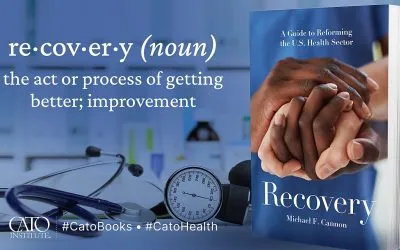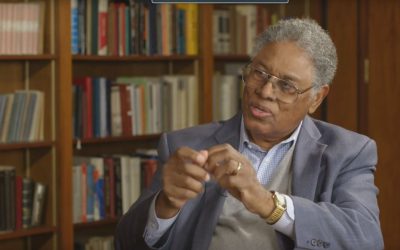Andrew Bernstein’s book is “among the best single presentations of the case for capitalism. (It is) amazingly good.” – Harry Binswanger
Books
Review of Brad DeLong’s Book “Slouching Towards Utopia: An Economic History of the Twentieth Century”
Berkeley economist Brad DeLong has an exceptional ability to get just about everything on the 20th century fantastically wrong in his book “Slouching Towards Utopia: An Economic History of the Twentieth Century.”
The Heart of a Cheetah: How We Have Been Lied to About African Poverty — and What that Means for Human Flourishing
In contrast to those who believe that experts can engineer progress for Africa, Magatte Wade argues that what is needed is deregulation, entrepreneurship, and investment.
The Meaning of Americanism: What America Is by C. Bradley Thompson
Review of “What America Is: The Moral Logic of the American Revolution and Other Essays” by C. Bradley Thompson (2023).
Recovery: A Guide to Reforming the U.S. Health Sector
If you support universal health care and the right of patients to make their own health decisions, there might be more for you in Recovery than you might think. I hope you’ll give it a look.
The Dutch and The Beginning of the Modern World
Maarten Prak and Jan Luiten van Zanden show in their new book Pioneers of Capitalism: The Netherlands 1000-1800 that the Dutch preindustrial history of growth, trade, and reliance on markets for their daily bread changed well before the mid-1600s.
A Review of Liz Cheney’s book Oath and Honor: A Memoir and a Warning
Edwin Locke’s summary and review of Liz Cheney’s book Oath and Honor.
Effective Egoism: An Individualist’s Guide to Pride, Purpose, and the Pursuit of Happiness
Watkins argues that since you have only one life and it’s for you to live, you should make it the best possible: a life in which you pursue your long-term happiness. Effective Egoism describes how to do that.
After the Ivory Tower Falls: How College Broke the American Dream and Blew Up Our Politics―and How to Fix It by Will Bunch
A “free college” prescription would take us in precisely the wrong direction.
America and the Israeli-Palestinian Conflict
The actual injustice is that America has sold out the region’s only free society, Israel—along with freedom-seeking people across the Middle East and among the Palestinian community—while empowering jihadist forces.
Books: “Social Justice Fallacies” by Thomas Sowell
“Many assumptions and phrases in the social justice literature are repeated endlessly, without any empirical test,” making it the “seemingly invincible fallacy at the heart of the social justice vision.”
Cuba’s Eternal Revolution Through the Prism of Insurgency, Socialism, and Espionage
Cuba’s Eternal Revolution Through the Prism of Insurgency, Socialism, and Espionage relates much about Cuba’s history that needs to be known, and disabuses readers of the carefully cultivated idea that Cuba has turned into a tropical paradise due to socialism.
The New Deal’s War on the Bill of Rights: The Untold Story of FDR’s Concentration Camps, Censorship, and Mass Surveillance
The New Deal was completely unnecessary economically.
Books: Economics in Action by Brian Balfour
I would recommend that parents who want their children to be part of the solution, rather than part of the problem, should get this book for them.
Ron DeSantis on Florida’s Covid Response
Ron DeSantis new book The Courage to Be Free: Florida’s Blueprint for America’s Revival explains the backstory to his response and reveals the intense pressures he faced at the time, including the scientific influences that drove his decision-making.
Virginia Postrel’s “The Future and Its Enemies: The Growing Conflict over Creativity, Enterprise, and Progress” at 25
Dynamists and stasists have radically different visions of how the world works, or should work.
Evicted: Poverty and Profit in the American City
It is rare that a book can objectively present the facts and then draw all of the wrong conclusions. Evicted: Poverty and Profit in the American City, which won a Pulitzer Prize in 2017, is one such book.
Highway Heist: Do Our Roads Have to be Built by Government?
Roads don’t have to be built by government, and we would be better off if we had left it to private enterprise and voluntary cooperation.
Joseph Ladapo: Hero of the Pandemic
What we learn from Joseph Ladapo’s book “Transcend Fear” is that he has been a warrior against pseudoscience from the very beginning of this pandemic.
Gone Viral: How Covid Drove the World Insane
I would rank Justin Hart’s book among those that should be considered a staple reading on the covid epoch. It’s as much a medical and political history as it is a psychological study in mass hysteria.
Superabundance: One of the Greatest Books on Economic Development and Growth of the Past Decade
Gale Pooley and Marian Tupy’s book, “Superabundance,” use “time prices” – the length of time that people must work to purchase something – to measure how the state of the world is improving as we live longer, healthier, and more comfortable lives.
The Beautiful Tree by James Tooley
Parents want the best for their children. They realize that one of the keys to escaping poverty is a good education. The best education, they understand, comes from entrepreneurs who offer higher quality to stay in business and prosper. – Max Borders
Alternatives to Public Libraries
America’s past, is replete with examples of voluntary, cooperative associations which provided for the many needs of the citizenry. One of the most striking examples is the evolution of libraries in pre-Civil War America. Even today, alternatives to tax-sup-ported libraries exist.
Preferential Policies: An International Perspective by Thomas Sowell
Regardless of the reason or rationale, the social effect of affirmative-action policies is to politicize social relationships. And the consequences of this have been everything from systems of privilege and corruption to mob violence and civil war.
Subscribe for free.
Read by students, professors, and citizens, Capitalism Magazine provides over 9,000 free to read articles and essays from pro-reason, individual rights perspective.
No spam. Unsubscribe anytime.
























